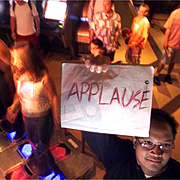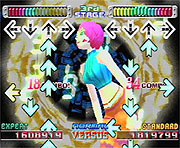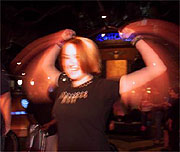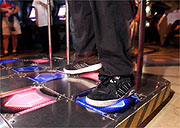|
Game fanatics say they want a
'Revolution'
By Marco R. della Cava, USA TODAY
SAN FRANCISCO — Reports have yet to
trickle in from Hades about Lucifer's lair freezing over. But
what else could explain the staggering scene playing out at
the Sony Metreon's video game arcade? A dozen kids cluster
around a machine as two contestants prepare for battle. The
onlookers have the triple-espresso fidget of antsy boxing
fans; the duelists squat, flex and shuffle like two
flyweights. The video game begins, yet no one here has that
glazed-over Night of the Living Dead look that plagues
teens the world over when they mainline a joystick-and-monitor
fix. In fact, with contestants and audience both hopping
around as if stepping on hot coals, there is more sweat being
shed than in a steam bath.
"I used to just sit
there staring at a screen," says reformed video-game couch
potato Samantha Valdez, 15. "Then my dad had me try this. And
I am hooked."
Her new drug of choice: Dance Dance
Revolution, or, as those in the know call it,
DDR.
It works like this: As a generic Japanese
techno-meets-bubblegum-pop dance tune thumps over the
machine's sound system, players watch a pattern of arrows
(north, south, east, west) scroll down a screen. The goal is
to step on the corresponding dance floor arrow as it lights up
— on the downbeat — beneath you. A bit like Twister, if
you spun that plastic dial four times a second.
Depending on the arcade, each trip to
this dance floor can range from less than a dollar to a pricey
$2.50. But cost means little to DDR addicts, who as a
group defy definition. Here at the Airtight Garage video
arcade, part of the massive Metreon entertainment complex, the
crowd includes whites, Asians, Hispanics and African-Americans
— from preteens to adults. And while high school boys may be
the staple DDR hoofer, girls are known to tear it up,
too.
A monster hit in Japan since 1998,
DDR hit California's shores a year later. But only now
is the game coming into its own here, as Web sites spread the
gospel and trumpet tournaments everywhere from Lynchburg, Va.,
to Austin, Texas, to Antioch, Calif.
When ddrfreak.com expanded its focus from
northern California to the nation last spring, the fan site
saw its monthly page views triple to a million. "Every time I
think this will end, another machine pops up somewhere," says
site co-founder Jason Ko, 22, a software engineer from
Mountain View, Calif.
By his site's count, there are 620
arcades nationwide with at least one DDR machine;
California tops the list with 218 locations, while Texas (37)
and New York (23) follow. Seven states and the nation's
capital have yet to capitulate to the craze.
In DDR chat rooms, many players
refer to the "DDR diet," for the game's ability to
double as a hip StairMaster. "The success of DDR proves
that people are sick and tired of passive types of games,"
says Jason Enos, product manager at Konami, the Japanese
company behind DDR. "Parents have always complained
about their kids coming home from school, grabbing a Twinkie
and hitting the video game for three hours. No more."
While DDR may not spell the end of
armchair video warriors, it is causing trend watchers to
ponder the resurgence of the old-time arcade, where a premium
was put on the interaction between gamer and audience, says
John Sellers, author of Arcade Fever: The Fan's Guide to
the Golden Age of Video Games.
"When I was a kid, I loved to go to the
arcade, beat a friend at Pac-Man and revel in the crowd
reaction," Sellers says. "Then came all those years of vegging
out on the couch. Now maybe there's a game to cure that
disease."
Dave & Buster's, a restaurant and
arcade chain targeting adults, has added a DDR machine
at each of its 29 locations nationwide. Says cofounder Dave
Corriveau: "The trend is definitely toward participation and
games that make you sweat. Besides, who doesn't want to see a
friend make a fool of themselves?"
If you're a bit shy about hopping on a
DDR machine without any practice (the fear is
warranted; neophytes risk serious bruises to the ego), there
is a home version made by Konami for Sony's PlayStation 2. A
new preteen edition featuring remixed Disney songs (imagine a
techno version of It's a Small World) bows Sept.
18.
But home is for practice. Serious players
head for the arcade.
Despite its name, heavy DDR use
does not guarantee one the glorious glide of Fred Astaire or
Ginger Rogers. In fact, most players confess to having two
permanent left feet. "I'm actually a really bad dancer," says
Erin Lavelle, 19, of Fox Lake, Ill., who routinely drives 45
minutes to the nearest DDR machine. She spent much of a
recent visit to San Francisco at the Metreon, proudly
displaying a T-shirt covered with DDR arrows. "But when
I'm on this dance floor, I hear people say 'Wow!' It
feels good."
That comment is typical. DDR
players like the challenge of winning a crowd's affection,
proof that, given the right motivation, kids will put down the
home video controls, head to a harmless social setting and
(horrors!) interact face-to-face.
"My friends are all complaining that I'm
never on e-mail anymore," says Zach Daily, 19, of Concord, Va.
Now that he's offline and dancing, Daily actually has improved
his fitness for soccer. "I've been 145 pounds my whole life,
and now I'm 135, and I don't have 10 pounds to lose. I check
out all the buffets I can."
In fact, a good number of DDR
players have lost weight improving their game. Eric Kjellman,
24, of San Jose, Calif., stomped his way down from 380 to 250
pounds. Todd Brown, 25, dropped 35 pounds but got tired of
hunting down DDR machines, his exercise equipment of
choice. So he recently bought a used arcade version on eBay
for $5,000.
"There aren't many things that keep me
active, but this does," says the blackjack dealer from Prior
Lake, Minn., who posted a message on ddrfreak.com urging any
experts in the region to drop by his home. "I just close the
door to my garage and go at it. I don't dance and I have no
style. It's a workout."
Dave Henkin, 24, of Austin, Texas, has
been playing for a year, lost 60 pounds ("my sister didn't
recognize me") and figures he has spent a few thousand dollars
pumping tokens into DDR machines.
Henkin could soon shell out more money as
other interactive video games tearing up Japan make their way
across the Pacific. Dubbed Bemani games (for "beat mania"),
they include contests that involve strumming guitars, beating
drums and playing keyboards. Konami, which makes most of
Japan's top Bemani games, is considering bringing Guitar
Freaks stateside next. But right now, DDR
reigns.
At the Metreon, all eyes are on two
machines, DDR 1.5 and DDR USA. (While we have two editions,
each featuring different songs, Japan has six.) True players
shun USA. "The songs are wimpy," says four-time DDR
tournament champion Cesar Aldea, 30, who out here goes by the
nickname DJ 8-Ball.
Aldea is tops in DDR freestyle, in
which players must hit enough flashing arrows to advance to
the next song but are scored mainly on their moves and style.
The other category is called "perfect," in which dancers win
solely based on the number of times they match a series of
steps.
Watching Aldea shake, rattle and roll his
limber frame while popping the balls of his feet onto 6-inch
squares just as they light up — and they light up like a
paparazzi flashstorm at his level of play — is enough to have
DDR petitioned as a new Olympic sport. If this is a
video game, then sky diving is just a humble alternative to a
jetway.
The crowd is swelling. Moms pushing
strollers stop and stare; a tourist with a video camera can't
stop filming. A few feet away, a kid is posting a dazzling run
on a car-chase video game called Rush 2049. And no one
could care less.
"You are a perfect dancing machine!" says
the mechanical male voice of the DDR 1.5 machine, as Derrick
Ingram, 19, steps off the platform to an excited murmur.
Nearby, Zoila Acosta, 20, tracks Ingram
with her eyes. She's a player; in fact, her outfit consists of
huge arrows sewn onto her jeans and white T-shirt, her way of
recycling her DDR home game after the floor panels
broke from excessive practice.
"When I first got on the machine a year
ago, I looked like a fool," she says. "But I kept at it. I
prefer this to going to the gym."
Acosta pops on her backpack and wanders
over to Ingram, sweat pouring off his wrestler's shoulders. A
few minutes later, they're still talking, he miming DDR
moves, she trying to copy them. Then they're up on the
side-by-side platforms of DDR 1.5, bopping in time.
Dance Dance Revolution won't make
you rich, brilliant or president. But anyone still clinging to
their joysticks should answer this question: When's the last
time a video game got you a date? | 









